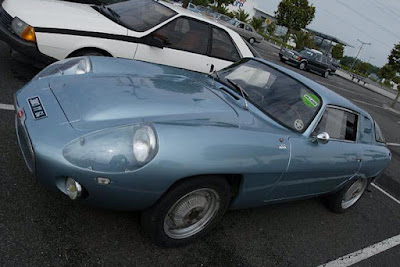Fleeting Brilliance - In the mid-20th century, the automotive world saw a fascinating shift. While some established French luxury and sports car brands disappeared, a new wave of small-scale manufacturers emerged. These companies found innovative ways to build unique vehicles by repurposing affordable, mass-produced mechanical components. Their creations were often adorned with lightweight fiberglass bodies, resulting in colorful and sporty cars that showcased bold creativity. Among these pioneers, Alpine and René Bonnet/Matra gained fame, but others like Arista also left their mark, albeit less known internationally.
 |
| The Arista JD Sport Coupe was a streamlined fastback coupe with a touch of Italian design elegance, built on the Panhard PL 17 chassis. (Picture from: French Classic Car On Facebook) |
Arista was born in 1952, thanks to Raymond Gaillard, a Parisian dealer of Panhard and NSU vehicles. Gaillard had previously experimented with manufacturing a small roadster called the Callista, which was built on the foundation of the Panhard Dyna X. While his early efforts faced financial struggles, they laid the groundwork for what would become the Arista brand. At the 1953 Paris Salon, Gaillard unveiled the first Arista models, which evolved from the Callista's design. The company's standout creation soon followed—a 2+2 coupe named Passy, featuring a sleek fiberglass body that caught the attention of enthusiasts. A two-seater variation, called the Rallye, added further charm to Arista’s lineup.
 |
| The Arista JD Sport Coupe was the result of a collaboration with designer Jacques Durand, who later created the Jidé sports car, as a successor to the Passy and Rallye models. (Picture from: Giani-Agnelli.HatenaDiary.org) |
In the early 1960s, Gaillard collaborated with Jacques Durand, a designer who would later create the Jidé sports car. Together, they envisioned a successor to the Passy and Rallye models. The result was the Arista JD, a streamlined fastback coupe with a touch of Italian design elegance. Debuting in 1963, the JD was built on the Panhard PL 17 chassis and powered by an air-cooled, two-cylinder engine. Despite its modest 850cc displacement, the engine delivered 60 horsepower, propelling the lightweight car, weighing just 620 kilograms, to an impressive top speed of 160 kph.
 |
| The Arista JD Sport Coupe, equipped with an air-cooled two-cylinder 850cc engine, delivered an impressive 60 horsepower. (Picture from: French Classic Car On Facebook) |
Unfortunately, the Arista JD faced an uphill battle in the market. Its high price deterred potential buyers, and its engine, though efficient, felt outdated compared to modern alternatives. With only six units produced, the JD failed to secure commercial success. By 1967, Arista ceased operations after producing just 106 cars across all its models.
 |
| The Arista JD Sport Coupe, designed for agility and efficiency, weighed just 620 kilograms, making it a standout in lightweight engineering. (Picture from: French Classic Car On Facebook) |
 The story of Arista highlights the richness and diversity of automotive history. While the JD and its predecessors may not have achieved widespread acclaim, they stand as testaments to ingenuity and passion. These cars remind us that even lesser-known brands have contributed to the vibrant tapestry of automotive design and innovation. The legacy of Arista serves as an inspiration to uncover the hidden gems in the world of classic cars, where creativity flourishes in the face of challenges. *** [EKA | FROM VARIOUS SOURCES | RITZSITE.NL | DEBRITO.CHEZ | LEROUX.ANDRE.FREE.FR | FRENCH CLASSIC CAR ON FACEBOOK | GIANI-AGNELLI.HATENADIARY.ORG ]
The story of Arista highlights the richness and diversity of automotive history. While the JD and its predecessors may not have achieved widespread acclaim, they stand as testaments to ingenuity and passion. These cars remind us that even lesser-known brands have contributed to the vibrant tapestry of automotive design and innovation. The legacy of Arista serves as an inspiration to uncover the hidden gems in the world of classic cars, where creativity flourishes in the face of challenges. *** [EKA | FROM VARIOUS SOURCES | RITZSITE.NL | DEBRITO.CHEZ | LEROUX.ANDRE.FREE.FR | FRENCH CLASSIC CAR ON FACEBOOK | GIANI-AGNELLI.HATENADIARY.ORG ]Note: This blog can be accessed via your smart phone.


 Logging you in...
Logging you in...